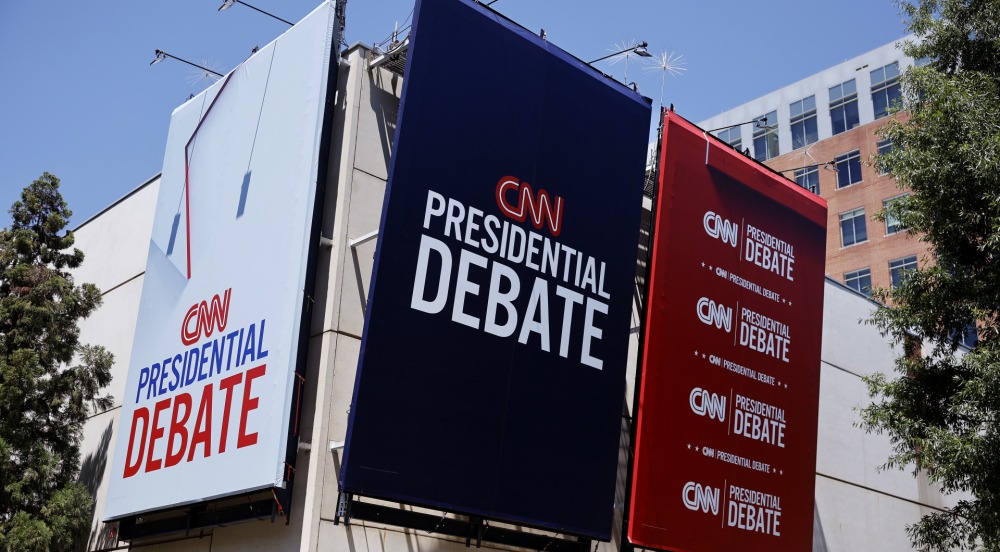Pre-Debate Tensions
Newsom’s Criticism of Trump
California Governor Gavin Newsom has been vocal ahead of the debate, calling former President Trump “unhinged” and “delusional.” Newsom expressed concern about Trump’s mental capacity and ability to control himself. He believes Americans will see a strong and vigorous president in Biden, defending a strong record and laying out a compelling vision for the future.
Exclusion of Black Media
Accusations Against CNN
CNN has faced accusations of excluding Black media from covering the debate in Atlanta, raising concerns about its influence on the election narrative and potential voter suppression in predominantly Black and Brown communities. Notable Black media organizations, including EBONY, Atlanta Black Star, and Atlanta Voice, have reported being denied press credentials or not being informed of application deadlines. This exclusion raises significant questions about the inclusivity and fairness of the media landscape.
Advocacy for Inclusion
The Biden-Harris campaign has actively advocated for the inclusion of local and national Black outlets at the debate. CBCPAC Chairman Rep. Gregory Meeks has called on CNN to credential a minimum of ten Black-owned media outlets. This advocacy underscores the broader implications for Black and Brown communities, where voter suppression has historically been a significant issue. Black media represents millions of people, and their presence is crucial for an inclusive and fair media landscape.
The exclusion of Black media from such a high-profile event has sparked a broader conversation about media representation and equity. Historically, Black and Brown communities have faced systemic barriers to full participation in the democratic process. Media representation is a critical component of this participation, providing a platform for diverse voices and perspectives. The Biden-Harris campaign’s push for greater inclusion reflects an understanding of these dynamics and a commitment to addressing them.
WHCA’s Criticism of CNN
Press Exclusion
The White House Correspondents’ Association (WHCA) has publicly criticized CNN for excluding outside press from the debate, which was brokered by the campaigns. The debate will lack an audience, and microphones will be muted when a speaker’s time is up, limiting off-mic remarks. Journalists unaffiliated with CNN have been relegated to a separate building from the debate hall. This separation restricts their ability to provide comprehensive coverage and raises concerns about transparency and accountability.
Calls for Access
The WHCA urged CNN to grant access to at least one print pool reporter for the duration of the debate. Despite support from the Biden campaign and no opposition from the Trump campaign, CNN rejected the plea. The WHCA argued that the muting of candidates’ microphones further emphasized the need for a reporter to record what the television stream wouldn’t capture.
The role of the press in democratic societies is to ensure transparency and accountability. Pool reporters, in particular, play a crucial role in this process, providing detailed and independent accounts of events. By excluding these reporters, CNN limits the information available to the public and undermines the principles of a free and open press. The WHCA’s call for greater access is not just about the logistics of covering an event; it’s about upholding these fundamental democratic principles.
NABJ’s Request for Inclusion
Credentials for Black Press
The Atlanta Black Press was granted credentials by CNN to cover the discussion at the request of the National Association of Black Journalists (NABJ). The group stated that the application for credentials closed on June 7 and asked CNN to create space to ensure fair and balanced coverage. NABJ emphasized the importance of Black-owned and operated media being present to record, create, and share content for their audiences.
The exclusion of Black media from the debate highlights broader issues of representation and equity in the media landscape. Black-owned media outlets play a crucial role in covering stories and perspectives that are often overlooked by mainstream media. Ensuring their presence at major events like the presidential debate is essential for a balanced and inclusive media environment. The NABJ’s request reflects a broader push for greater diversity and representation in media coverage.
The exclusion of Black media and the controversy surrounding press access underscore the broader challenges facing the media landscape. These issues are not just about who gets to cover a particular event; they are about who gets to participate in the democratic process and whose voices are heard. As the nation approaches a critical election, it is essential that all voices are heard and the democratic process is upheld.
The Biden-Harris campaign’s advocacy for Black media inclusion and the WHCA’s call for greater press access highlight the importance of these issues. They reflect a broader understanding of the role of the media in democratic societies and the need to address systemic barriers to full participation. As the first presidential debate of 2024 approaches, these controversies serve as a reminder of the ongoing struggles for equity and representation in the media landscape.
In summary, the first presidential debate of 2024 between Joe Biden and Donald Trump promises to be a significant event, not only for its political implications but also for the controversies surrounding media access and representation. The debate will be a critical moment in the election, and the issues of media exclusion and representation will continue to shape the broader narrative. As the nation prepares for this pivotal event, it is essential to ensure that all voices are heard and that the democratic process is upheld.
Lucky Khan specializes in event and incident coverage, bringing his keen insights and comprehensive reporting to the forefront. With a knack for capturing the essence of major happenings, Lucky keeps his readers informed and engaged with the latest updates.

